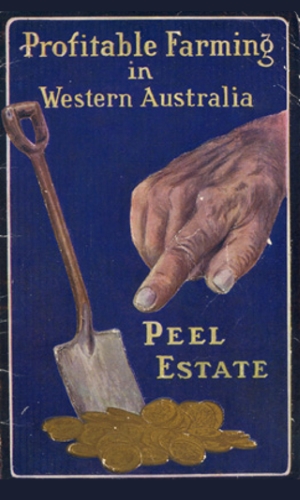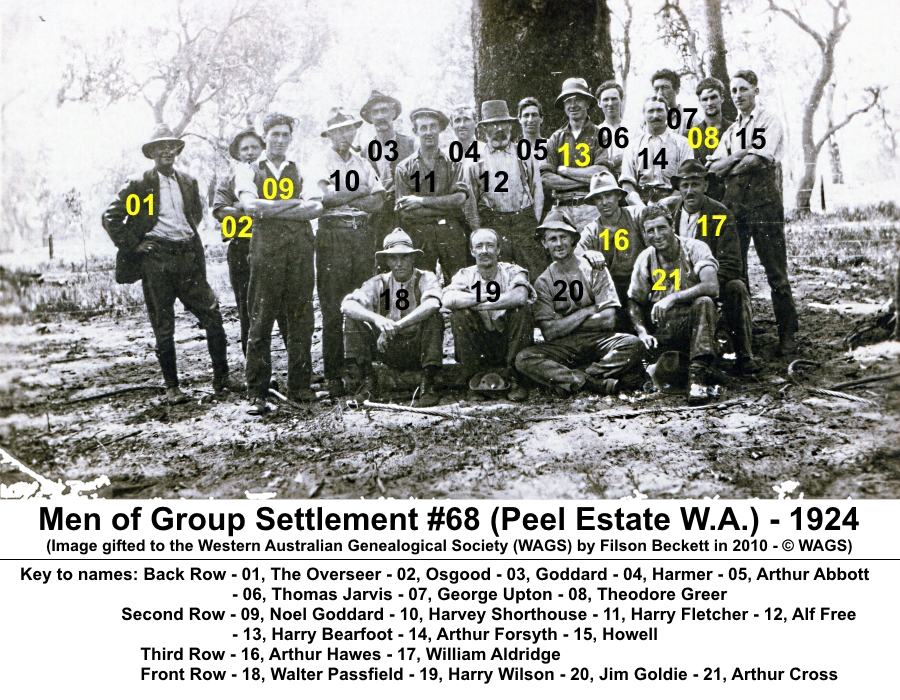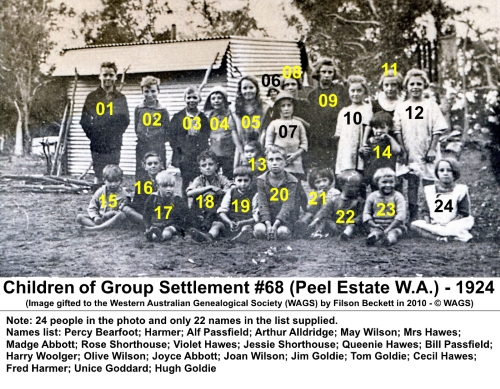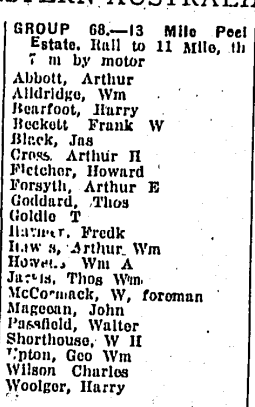GROUP SETTLEMENT IN WA 
Group 68 on the Peel Estate
Governments often have good ideas. The problem seems to be making them work….
In 1921, with so many of its young men lost to the Great War, Western Australia was in desperate need of new settlers. The Government of the day offered free land and assisted passage to British families who were willing to develop farms in the State’s South West.
Settlers were to work in groups of 20 developing the land and later each would take over a farm when it was fully prepared. Groups were established in the Manjimup district, followed by others at Denmark, Northcliffe, etc. as well as on the Peel Harvey Estuary south of the State’s capital, Perth.
6,000 families, keen to leave the austerity of post war Europe applied to be part of the scheme, but many soon became disillusioned. Most of the land was heavily forested and had to be cleared by hand. Living conditions were incredibly harsh.
Ultimately the scheme ran into trouble and by 1925 was the subject of a Royal Commission. It was a social and financial tragedy, another good idea which went horribly wrong.
In 2010, two photographs were donated to the WAGS Library by the family of the late Filson Beckett.
The images showed men and children of Group 68 on the Peel Estate in 1924. The listing of members of this group in the WA Post Office Directory for the years 1924 (image right) and 1925 include Frank Beckett, farmer, and he was surely the reason for Filson’s interest in the photographs.
Most of the men and children in the photographs are named, and WAGS is making the images and the details that accompanied them available, in the hope that they will help the descendants of these families tell the story of their forebear’s experiences on Group 68. We are confident this is what Filson would have wanted.
• Information about WA Group Settlement records can be found in Dead Reckoning on the website of the State Library of WA.
• The National Archives of Australia also holds Group Settlement records and their Fact Sheet #123 provides further information.
Image of Men of Group Settlement Number 68 on the Peel Estate in 1924
 (Click to zoom - without ID numbers)
(Click to zoom - without ID numbers)
WAGS member, the late Filson Beckett’s notes accompanying the photographs
Notes accompanying Photograph 1 - Men of Group 68 photographed in 1924
1st row:
01. The overseer
02. Osgood - the Passfield family replaced the Osgood family on the group, possibly in transitional stage when this photograph taken
03. Goddard - had left the group by mid 1924 (before the Beckett family)
04. Harmer
05. Arthur Abbott
06. Thomas Jarvis
07. George Upton
08. Theodore Greer - the Greer family replaced the Beckett family on the group, possibly in transitional stage when this photograph taken
2nd row:
09. Noel Goddard - had left the group by mid 1924 (before the Beckett family)
10. Harvey Shorthouse
11. Harry Fletcher - not an original in the group
12. Alf Free - not an original in the group
13. Harry Bearfoot
14. Arthur Forsyth
15. Howell - had left the group by mid 1924 (before the Beckett family)
3rd row:
16. Arthur Hawes
17. William Alldridge
4th row:
18. Walter Passfield - the Passfield family replaced the Osgood family on the group, possibly in transitional stage when this photograph taken
19. Harry Wilson
20. Jim Goldie
21. Arthur Cross
NB - Harry Woolger, James Black, W. McCormack (and possibly also Frank Beckett) are missing from the photograph but were still on the group in 1924
Image of Children of Group Settlement Number 68 on the Peel Estate in 1924
 (Click to zoom - without ID numbers)
(Click to zoom - without ID numbers)
Notes to accompanying Photograph 2 - Children of Group 68 photographed in 1924
Percy Bearfoot; Harmer; Alf Passfield; Arthur Alldridge; May Wilson; Mrs Hawes (#05); Madge Abbott; Rose Shorthouse; Violet Hawes (#10); Jessie Shorthouse; Queenie Hawes (#12); Bill Passfield; Harry Woolger; Olive Wilson; Joyce Abbott; Joan Wilson; Jim Goldie; Tom Goldie; Cecil Hawes; Fred Harmer; Unice Goddard; Hugh Goldie
NB - Mrs Hawes, and her daughters Violet and Queenie Hawes have been recently identified by a descendant.
The shed in the background was 10 feet (3 metres) x 1.2 feet (3.6 metres) and was one of the living quarters for families
___________________________________________________________________
Editorial Notes
Identifying numbers have been added to the above photos.
To the best of our knowledge the people named above refer to the people in the image position/s shown.
However the names in the photos (particularly of the children) may be incorrectly identified as the positions are not clearly identified in Filson’s notes. In the note which accompanies the photograph of the children there are 22 names, however there are 24 people in the photograph.
If you can confirm the names of any of these people, and / or correctly identify their position in the photos please contact us via email with the details at:
This email address is being protected from spambots. You need JavaScript enabled to view it. (<< click to send email)



